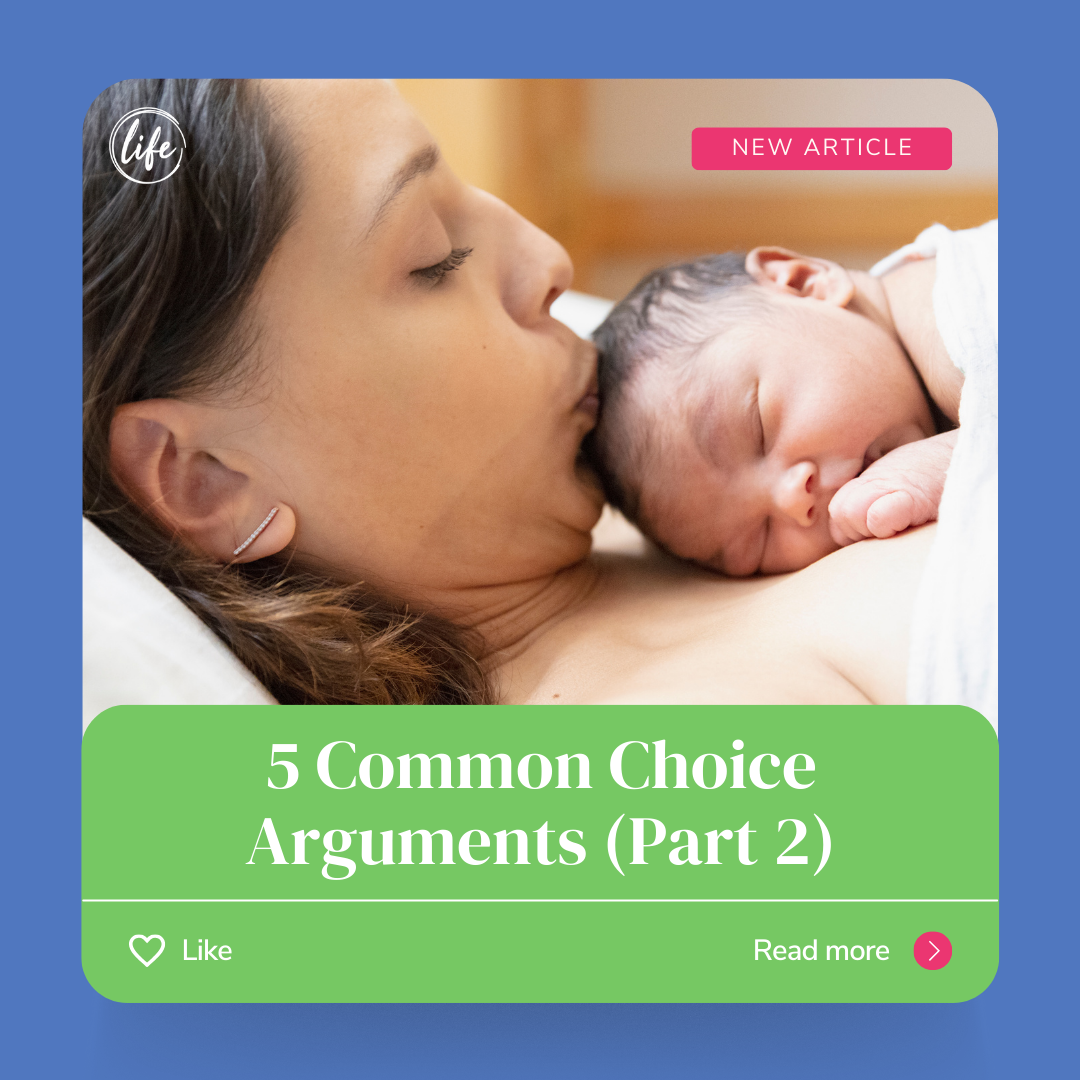
 Last month, we shared a few of the most common choice arguments we’ve encountered in our advocacy for the unborn. Let’s break down a few more of these arguments and share our responses:
Last month, we shared a few of the most common choice arguments we’ve encountered in our advocacy for the unborn. Let’s break down a few more of these arguments and share our responses:
Life Begins at Viability
Many choice proponents believe that life begins at viability, when a fetus can survive outside the womb. Does viability determine life though?
What about the baby born prematurely who needs artificial support for a period of time? Has that child’s life not begun? What about an older child or adult who experiences a medical emergency or accident that temporarily requires life support?
Do we, depending upon our health, go in and out of being “alive” and deemed worthy as humans? If independence is the threshold of life then children would not truly be human until close to adolescence.
You Can’t Force Women to Have Children They Don’t Want
Choice proponents believe that pro-life legislation forces pregnancy and birth on women who don’t want children. They also believe “unwanted” children shouldn’t be born.
Women are not being forced to give birth. When a woman has consensual sex, she and the man involved are accepting all the potential consequences of those actions, which includes pregnancy. With choice comes responsibility. It is that way with every choice we make. Once the choice to have sex results in the beginning of another human being, that human being has the right to life as well.
The Right to Life was the first right enumerated in the Declaration of Independence. It is reaffirmed explicitly in the 14th amendment to the Constitution. Thomas Jefferson said, “The care of human life and happiness, and not their destruction, is the first and only object of good government.” Good government’s primary focus is to protect human life. We should help women – not simply eliminate beginning human beings via abortion.
Regarding “unwanted children”, being unwanted should not cost a human being (the unborn) their life. Although the mother may not want to raise the child, every year there are an estimated 2 million couples waiting to adopt newborns; that’s 36 couples to every newborn available.
Organ Donation
We’ve heard the organ donation argument countless times. Many choice proponents compare a woman carrying an unwanted pregnancy to forcing someone to donate a kidney to save someone else’s life. However, in this scenario, we cannot liken a woman’s bodily autonomy to that of an organ donor’s, nor can we liken a fetus to that of an organ.
A person has full autonomy over their organs because those are their organs – the DNA identifies them thusly. However, the unborn baby has a separate genetic identity from the mother – separate DNA – and thus is not the same person or merely an organ of the mother.
The hypothetical kidney patient has no connection to the donor, whereas the fetus has an intimate connection/relationship to the mother from the moment of conception. A random stranger has no claim on another person’s organs. There is no tie of responsibility. However, the mother and father have a responsibility to the baby which they created through their own actions. Our decisions carry responsibility.
Abortion Is a Constitutional Right
We often hear abortion referred to as a “reproductive right.” In the United States, our rights are outlined in the Constitution — and not once does the Constitution say abortion is among those rights. However, we are granted the Right to Life.
The Declaration of Independence asserts: “We hold these truths to be self-evident, that all men are created equal, that they are endowed by their Creator with certain unalienable Rights, that among these are Life, Liberty and the pursuit of Happiness.” The 14th Amendment to the Constitution reaffirms the right to “life, liberty, or property.” This includes the unborn, born, handicapped, elderly, etc. Human rights — the first of which is the Right to Life — must be paramount.
We should not punish women who find themselves in an unintended pregnancy. We should provide a full generous spectrum of resources. Neither should we punish the unborn human by ending its life.
The Right to Life Does Not Include the Unborn
Choice proponents insist that the Right to Life only refers to persons born. However, careful reading of the text makes it clear that assertion is untrue.
“All persons born or naturalized in the United States, and subject to the jurisdiction thereof, are citizens of the United States and of the State wherein they reside.”
This first excerpt defines how citizenship is determined for persons.
“No State shall make or enforce any law which shall abridge the privileges or immunities of citizens of the United States; nor shall any State deprive any person of life, liberty, or property, without due process of law; nor deny to any person within its jurisdiction the equal protection of the laws.”
The second excerpt first speaks to the specific protections for citizens and then more broadly for “persons.” We, of course, recognize that people – even non-citizens – have life, liberty, and property protections.
Stay tuned for more common choice arguments and our responses! Learn more about the various stages of fetal development (conception, first, second, and third trimester) and don’t forget to follow us on social media (Facebook, Instagram, and TikTok).